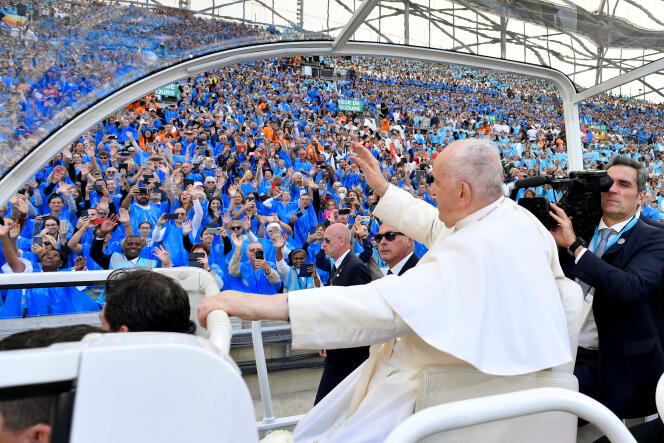


Seated in the front of a small, all-white Fiat 500 with the window down, amid police cars with black windows, he greeted the people of Marseille. Very early on Saturday, September 23, Pope Francis resumed the visit he had started the day before, full of symbols and public emotion, not least because everyone understood that the visit to this city in southern France by such a tired man was perhaps his last outside Rome. "I think that this evening, even the Bonne Mère (another name for the Basilica of Notre-Dame-de-la-Garde) had a tear in her eye," said the Archbishop of Marseille, Msgr Jean-Marc Aveline, as he bid farewell to his friend Francis.
On Friday, at the end of a parking lot, against the simple backdrop of a Camargue cross and a sea battered by the mistral wind, the pope criticized the "woodworm of extremism" and "fanaticism of indifference" towards shipwrecks and drowned victims that everyone "gets used to," considering them as "numbers," instead of "faces and stories." Among these faces was Moussa. The pontiff shook the hands of the 23-year-old Guinean rescued by the Aquarius, the first rescue ship of the humanitarian organization SOS Méditerranée, and thanked the heads of the organization, saying: "I am pleased to see here so many of you who go to sea to rescue migrants. And many times you are prevented from going." Some saw this as a highly political warning to France and Italy.
The pope's Saturday in Marseille began with a "breakfast with the poor." The meeting took place at the home of the Sisters of Charity, in the Saint-Mauront district of the city's 3rd arrondissement. Originally, the meeting was to be held at the archdiocese, but at the last minute, Francis had the program changed to visit Mother Teresa's missionaries, in one of France's poorest neighborhoods. Outside the mission, neighbors couldn't believe their eyes. The pope, here, between a discount market and two halal food shops? On the phone, in Arabic, a passerby tried to convince his wife.
The nuns placed a blue and white necklace around the pope's neck and sang, clapping their hands. "I'm happy to be here," in a place "where people hold each other's hands," Francis called out. "Abdullah, have you come to see the Holy Father?" asked 74-year-old Louise Contri, part of a group of 42 who works in the neighborhood as a parish volunteer. "People here call me Louise from the church," she said. "Compassion is what this pope is asking of us: that we apply the Gospel. This bothers some people because there are a lot of foreigners in the neighborhood."
You have 79.93% of this article left to read. The rest is for subscribers only.
